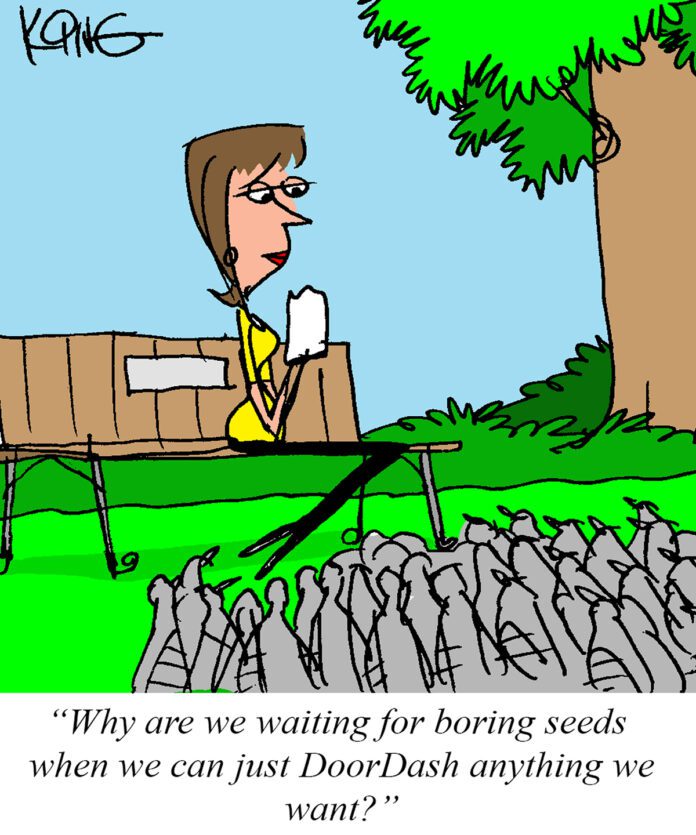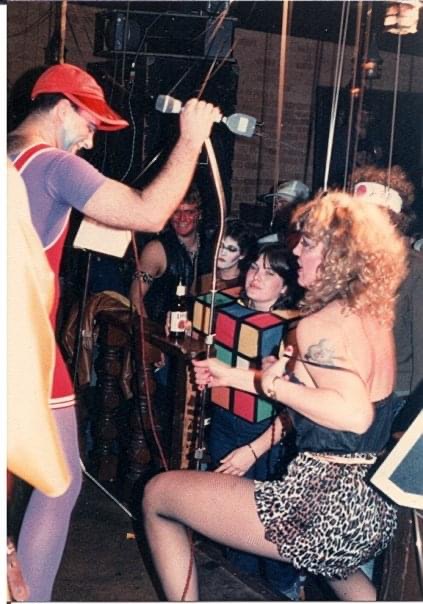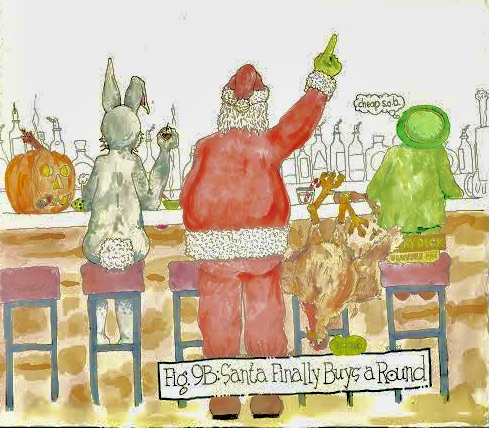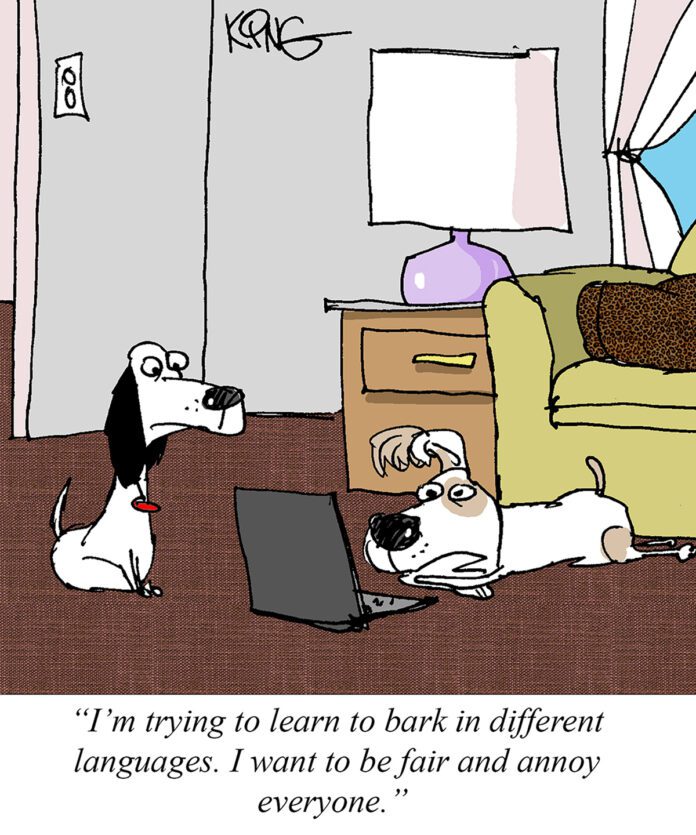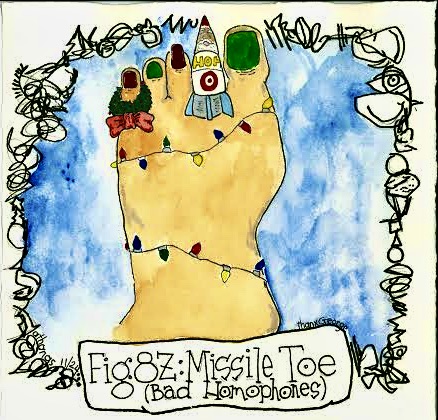Confessions of a rock ‘n’ roller girlaholic
Reaping the benefits, backlash of a rock band life
On a cold winter’s night (Feb. 9,1964, to be exact) a whole lotta television sets were tuned to CBS’ “The Ed Sullivan Show” to witness first-hand the American arrival of the four lads from Liverpool, The Beatles.
The musical landscape, and for that matter the world at large, would never be the same. What many thought would be a flash-in-the-pan phenomenon grew to be a cultural revolution, in the true sense of the term. Though the band played by the rules initially (suit and ties, “yes sir/no ma’am,” clean shaven with coiffed mop tops), they and a lot of other people slowly found it much more fun to taunt the social norms of the time.
And in addition to all the high-falutin’ academic, sociological, genre-bending aspects of the British Invasion, there was something that bubbled underneath – for me at least. It was all but indiscernible at the time, like a slow-moving, raucous weather system that hasn’t hit yet.
I was there, a distant witness to it all, itching to be in the fray, rebelling against authority (my parents), hungry to emulate my new found heroes. Goodbye Elvis. Hello, John, Paul, George and Ringo.
It wasn’t till recently, I suppose, that I recognized what that undercurrent was that I couldn’t put my finger on at the time. As those of us who were there recall, the cameras would switch from The Beatles performing to the audience’s reaction during the show. And that audience was majorly screaming girls.
So, sure, I wanted to be on stage singing and whoopin’ it up, but it hadn’t occurred to me, at the age of 10, that one of the major reasons for my interest and excitement was girls. Rock’n’roll was an indistinguishable path to girls!
Fast forward to Columbus, Ohio, around 1965. My Dad worked for the railroad, and he and the family got transferred to the capital. We lived in a suburb called Forest Park, an enclave of stucco homes and middle class families. By that time, I had been Beatle-ized: I had a six-foot poster of McCartney in my bedroom, I had all the Beatle albums at that point, and a mass collection of Beatle cards – the whole whammy. More than all o’ that, it was in this ‘burb that I first used my vocal cords to ‘spress myself.
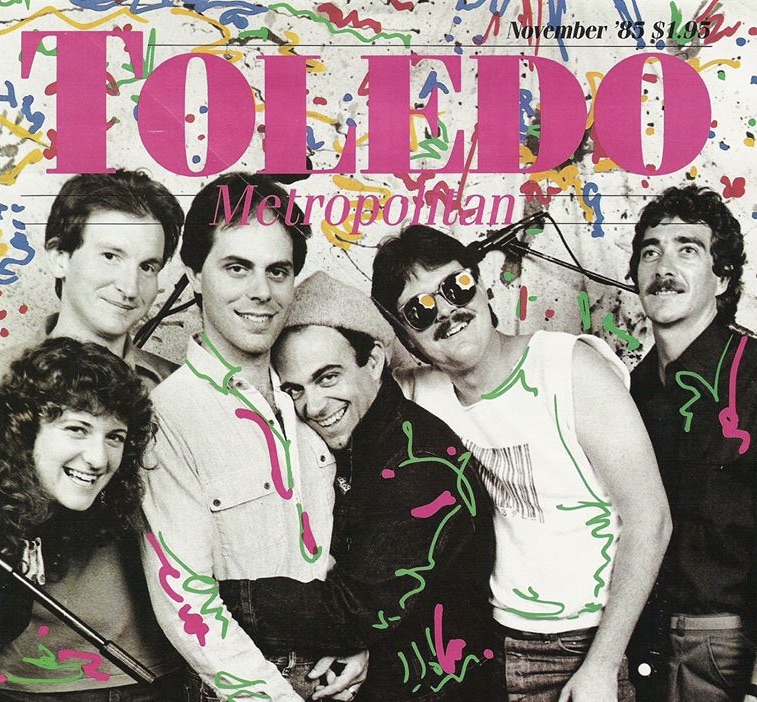
A kid my age lived directly across the street. Don King was his name, and he played a beige hollow-body guitar that was almost bigger than him. In no small part because of Beatlemania, we decided to get a band together, but because of certain restraints, we had to rehearse as a duo in the garage of my home. So, Don would drag his guitar and amp to my place, and we’d go at it, with the garage door open.
For whatever reason, we only knew one song: “Mrs. Brown, You’ve Got A Lovely Daughter,” by Herman & The Hermits. Over and over we’d do the tune – musta drove the neighbors nuts!


But the only neighbors that mattered to me were two sisters of my age, who lived kitty-corner across the street from me. I would literally fix my eyes on their upstairs bedroom window and croon, like a poor boy’s Romeo and Juliet. Try as I may, though, it was for naught, but I still felt that rock ‘n’ roll was my vehicle to get female attention and L-O-V-E!
Eventually, puberty, testosterone and my sexual id came into being. I succeeded a couple of times in obtaining girlfriends in the years that followed, but probably the most memorable of my encounters happened when I was in my early 20s. I had already taken the cue from The Beatles and the screaming girls and formed a few rock bands. At the time, I was in a “blues” band called Strongheart, and I was also enrolled at the University of Toledo, working to become a commercial artist (a term that eventually morphed into graphic artist.).
Part of the course study was a beginner’s psych course. I liked the class well enough, but what I really liked was the young lady who sat in front of me. A true beauty (she still is) who made my heart go wingy-wangy (a technical term.)
As luck (and fate) would have it, she came to see Strongheart one night. I was on her like wings on a bird, and we chatted up a storm. One thing led to another and we consummated our love. Our bumpy relationship lasted many years.
So, in the late ’60s/early ’70s I found that with my “position” as lead singer/goofball of a rock band, people (read “girls”) would come up and talk/flirt/entice me into their auras. But I also took the initiative, feeling more cocksure (pun intended) to talk to women I would heretofore never approach.
One incident that I remember was on Halloween. The band (Wet Shavers, I think) was playing at Howard’s Club H in Bowling Green. It was wild, with all kinds of costumes, liquor flowing, cocaine up the nostrils – I’m surprised I survived those days! Towards the end of the evening, a tall, red-headed woman approached the stage. Dressed as some sort of S&M dominatrix, she grabbed my arm and handcuffed me. She didn’t unlock the cuffs till the next morning.
As I look back, something happened. I can see that things got a little out of hand. I became addicted to the female charm. I was no prince, that’s for sure, a plain somewhat chubby dude, but as the center of attention on stage, it was easy for me to talk to girls. I became a “girlaholic.”
My ego soared out of control, and I became reckless and ruthless. The huge, elephant-in-the-room irony was that this was supposedly the norm for the job. In those days, rock ’n’ rollers were supposed to be womanizers! Hell, we weren’t makin’ any money. Why not?!!
All of those incidents, though they may have been a whole lotta fun at the time, seem to ring mostly hollow now. Yeah, I say “mostly.” I mean, after all, what am I without all the bad-boy shenanigans that accompany rock ’n’ roll? Like I said, this is a lot of what rock ’n’ roll is/was about. I can’t deny it; I can’t take it back, and I won’t. To what avail? But it’s not where I am now.
This went on for years – nay decades. Self-centered, thinking with the wrong head. I hurt people. I am painfully aware that I’ve done multiple dumbshit things in my Life, but I’m still a true believer in Karma – what goes around comes around – whatever you wanna call it. So, for all of the stupid stuff I did, and however much time I have on this orb, I’m hoping to make amends, and for some semblance of redemption.
But as we all know, there are no guarantees, just death and taxes.
Merde.
Susie’s Coats, other charities collect warm clothes for TPS students
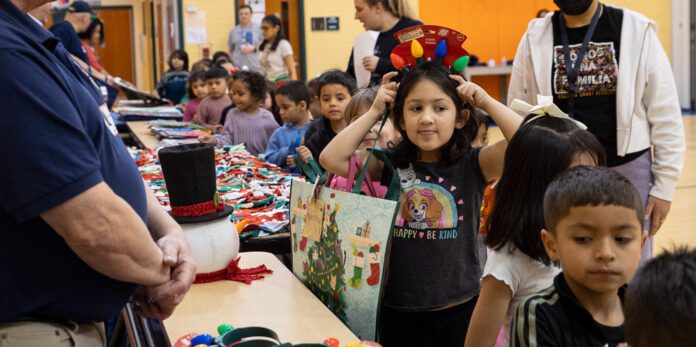

TOLEDO – Changes in weather make for changes in wardrobe, but quickly sprouting kids can easily outgrow clothes from the previous year. As it gets colder, there is a pipeline of organizations at the forefront of providing warm clothes for kids.
“We held our distribution in November, when 904 children passed through our doors, and it [their supply] wasn’t enough,” said Susan Perry, executive director of Susie’s Coats for Kids, about the need in the Toledo area.
Rising to meet the need, Susie’s Coats teamed up with Holland, Ohio company Designetics, which specializes in fluid applicators for manufacturing companies, and their humanitarian arm, Care for Kids, a nonprofit founded in 2020.
Sydney Williams, president of Designetics, said their first year getting Care for Kids up and running included a Trunk or Treat in the fall, but by the next year, “they [the kids] didn’t need candy, they needed coats.”
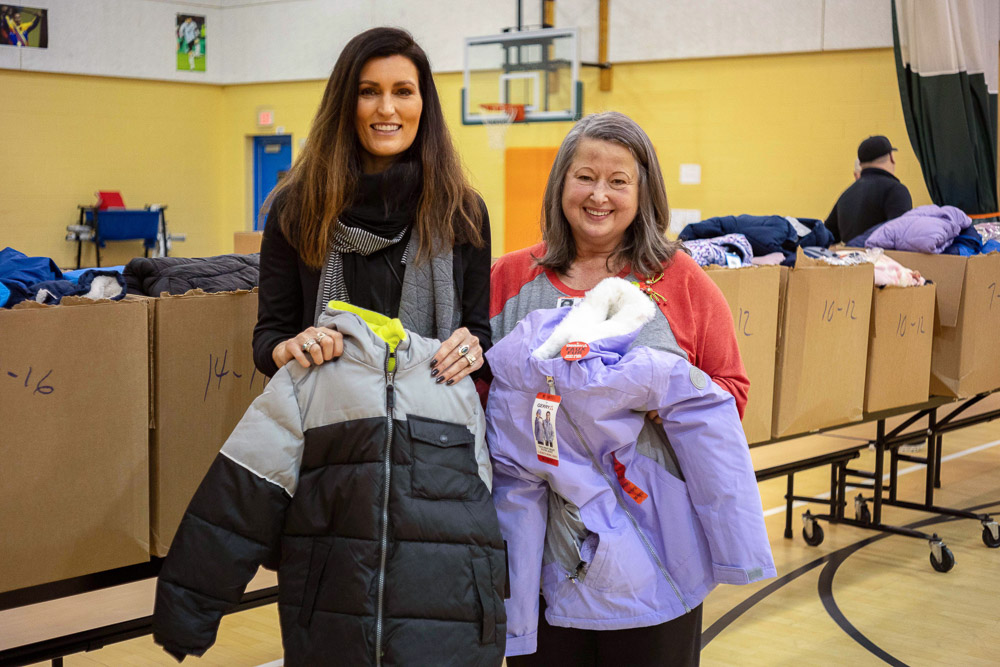

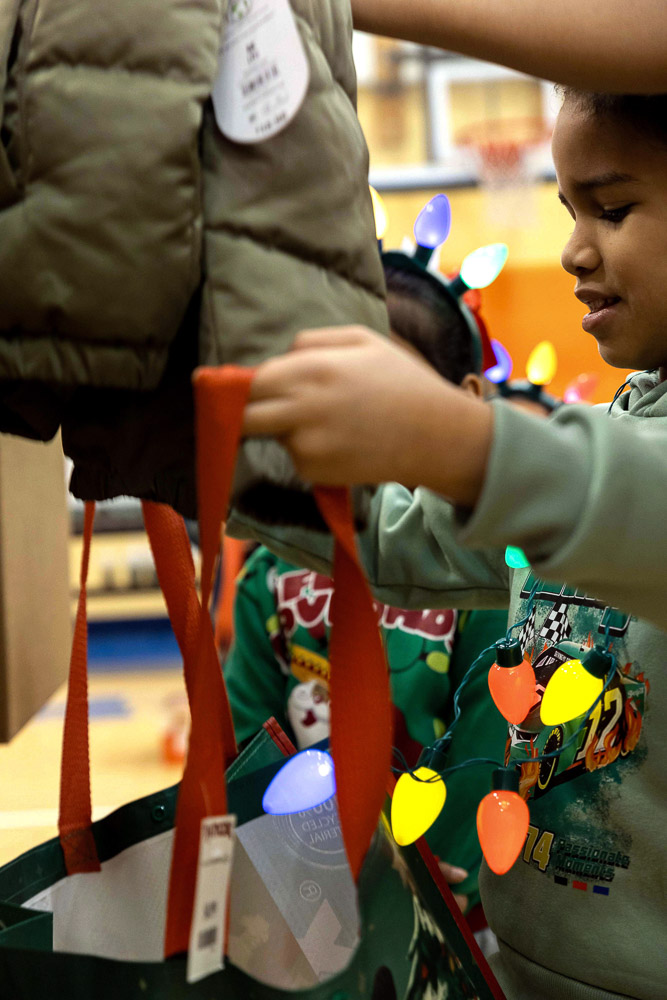

Perry became aware of northwest Ohio’s need to clothe children two decades ago and has worked doggedly to provide more resources to children.
The nonprofit’s main goal is to make sure kids have well-fitting and presentable coats without holes or tears when winter rolls around. Susie’s Coats’ primary storehouse is based in Millbury, but the nonprofit has 35 ‘coat closets’ within a 45-mile radius of Toledo, most of them based in elementary schools.
Perry said her nonprofit has experienced exponential growth since it began, and just last year merged with Hannah’s Socks, who shares a similar goal. Between the two nonprofits, Perry said 224,102 items of warm apparel, including coats, gloves and socks, have been distributed this year.
One distribution site was at Escuela SMART Academy in south Toledo, where Susie’s Coats, Designetics and the Toledo Zoo on Monday handed out winter-wear, along with other holiday items, during the Escuela holiday party.
“We know there’s a big need in our community, and we know it’s cold,” said Martha Ohashi, school nurse for Escuela SMART Academy.
Ohashi reminds teachers to be aware of kids consistently coming to school without warm clothes. “When the child comes into my office [after being recommended by a teacher], I make a call to their home, and I try to connect them to resources,” she said.
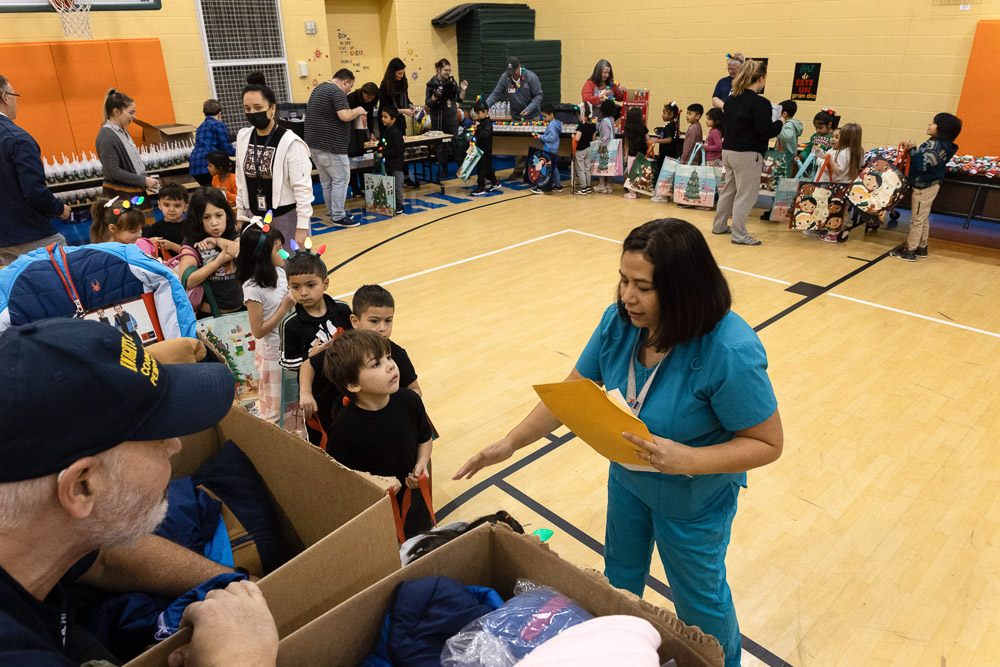

Linda Ruiz-Bringman, assistant superintendent of student, family and community engagement for Toledo Public Schools (TPS), is focused on meeting the needs of children throughout TPS, so that the students can perform well in school.
“The need is great within the Toledo area,” Ruiz-Bringman said. Because of this need, all TPS nurses have essential items on hand, ranging from clothes to hygiene items. “We are always engaging with families. Families will reach out to us and our department.”
The Community Engagement Department deals with a host of different issues, including students lacking food, access to internet, clothing or even basic access to utilities in their homes.
Information from schools and classrooms largely impact how aid gets to children. Perry’s organization has its hands full partnering with nonprofits and businesses to provide items, but relies largely on TPS’s reporting to decide where to distribute items and setup closets.




Natasha Allen, principal of Escuela SMART Academy, is well aware of the needs of her students, and estimated about 180 of her 285 students were in need of coats this year. Over the past four years at the academy, she said there is always a need for coats, and that each year at least half of the students need them.
“We’re just grateful to have them … so our kids can do well,” the principal said, and firmly added that “the students in need of coats are getting coats.”
As students at Escuela filed into the holiday party, grabbed holiday items and colorful socks, nurse Ohashi checked the names of students who needed coats with the size of coat that would fit them. Volunteers from the Perrysburg Knights of Columbus sorted through boxes of warm clothing items, and then handed them to students, who received them with smiles.
“We won’t stop,” Allen said resolutely, adding that the school would find other ways to support their kids if the need increases or the support dries up.
“We support the whole child, and that includes their family,” she said.
Unorthodox Christmas movie list
A few years ago, my wife had the great idea of watching what we jokingly termed the ‘Not-So-Christmasy’ list. Since then, our tradition has caught on with friends and family. Some of those recommendations are listed below should you ever wish to veer off the beaten path.
Caveat – I must confront the elephant in the room and forego the obvious argument for Die Hard as a Christmas movie. Because deep down in the depths of our hearts, we can all acknowledge the 1988 action classic is the new gold standard for the holiday must-watch. I mean, is it really Christmas unless we see Hans Gruber fall from the peak of Nakatomi Plaza and see John McClane emerge victorious? I don’t think so.
Eyes Wide Shut (1999): Stanley Kubrick’s swan song has garnered heaps of praise and rebuke since its release for its cold temperament; matching the cool hues of the Christmas lights and décor, which fill almost each individual shot of the film (a technique of on–screen lighting Kubrick used in his films). Between the sexual doubt sown between Bill and Alice Hartford (played by Tom Cruise and Nicole Kidman) and Bill’s odyssey into the abyss, the film is a masterful tale about the pitfalls of marriage gone awry.
Stalag 17 (1953): An all-time personal favorite, this chamber piece from Billy Wilder portrays the lives of American POWs in the German camp of the title name. As Christmas approaches in 1944, the occupants of Barracks 4 play cat and mouse to find if there really is a spy hiding amongst them in the wake of a botched escape of two of their comrades. Led by William Holden as the acerbic and opportunistic Sgt. JJ Sefton (the role that nabbed him the Oscar), this beautifully scripted comedy/thriller builds to an unforgettable climax where the ultimate Christmas present is gifted at the feet of the camp commandant.
Bad Santa (2003): Speaking of Oscars, I will die on the hill that Billy Bob Thornton deserved a nomination for his performance as scuzzy con-man Willie T. Stokes in this early 2000s comedy gem from Terry Zwigoff. With the help of his hilarious counterpart, played by Tony Cox, Thornton looks to make one last score as a drunken mall Santa before retiring to a life of buggery and cirrhosis. That is, before meeting the adolescent Thurman Murman – arguably the most endearing slab of innocence put on screen.
Fanny & Alexander (1982): For Swedish auteur Ingmar Bergman, whose repertoire was heavy with themes of psychological despair, war and the psyche of the sexes, this late-career landmark may be the most life affirming film he ever made. Centering on the eponymous siblings, the film plays out in the dreamscape of childhood while traversing familial issues in the early 1900s. Having only engaged with Bergman’s work within the last decade, I expected the usual emotional sledgehammer but found this film to have a delicate touch, even given the similar terrain.
Batman Returns (1992): The argument for this being a Christmas film has been the sequel to the argument for Die Hard in recent years. Even as it’s the darkest of all the Batman movies, the themes and mise-en-scene are all in place for a favorable argument. From the Penguin (a brilliant Danny DeVito) and evil Max Schreck (Christopher Walken) as the Krampus of Gotham City, the belle falling into the exploding tree, Michelle Pfeiffer’s scene stealing role as the anarchic Catwoman and Michael Keaton’s Batman shoveling his hero complex through the snows of Gotham, the film proves a worthy sequel to the 1989 blockbuster.
Trading Places (1983): One-part A Christmas Carol and one-part satirical send-up of early 80s Reaganomics, this social experiment in class was the peak of director John Landis’ run that began with 1978’s Animal House. Dan Aykroyd as the soulless stockbroker is a masterclass in one-arc storytelling. Together with prime Eddie Murphy as the lowly grifter, Jamie Lee Curtis as the hooker with a heart of gold, and a strong comedic supporting cast, this film holds up to the test of culture due to its always timely comedic punches.
Black Christmas (1974): Lastly, a cult classic from director Bob Clarke, the same director who gave us A Christmas Story a decade later. The film’s plot is as simple as can be: an unnamed, faceless killer stalks sorority girls, mainly Olivia Hussey and Margot Kidder, while on Christmas break in a “the call is coming from inside the house” scenario. Taking its cues from both the Italian Giallo genre and the Alfred Hitchcock school of dread, this low–budget horror film was a great influence on later classics like John Carpenter’s Halloween (1977) and Friday the 13th (1980).
Toledo Firefighters Local 92 donates to MLK Kitchen for the Poor
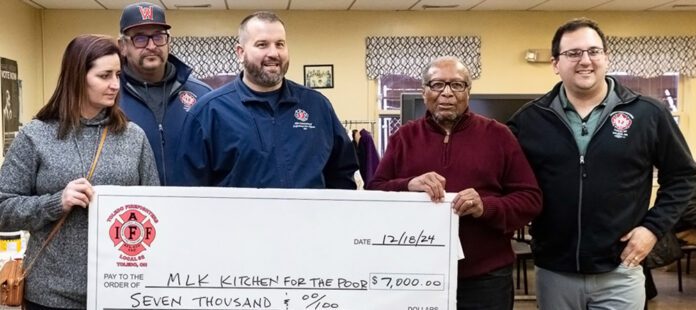

TOLEDO – The Junction neighborhood, just west of downtown, has been the focus of numerous revitalization efforts, but one of the lifelines to this community has stayed active since 1969.
The late reverend Harvey Savage Sr. didn’t need a sign from above to start feeding the poor; he looked out his back window.
“He was inspired by a man eating out of the garbage in the back yard,” recalled Harvey Savage Jr. “He invited the guy inside, and said, ‘We need to be feeding people.’”
Out of that moment, Savage Sr. decided to start the MLK Kitchen for the Poor.
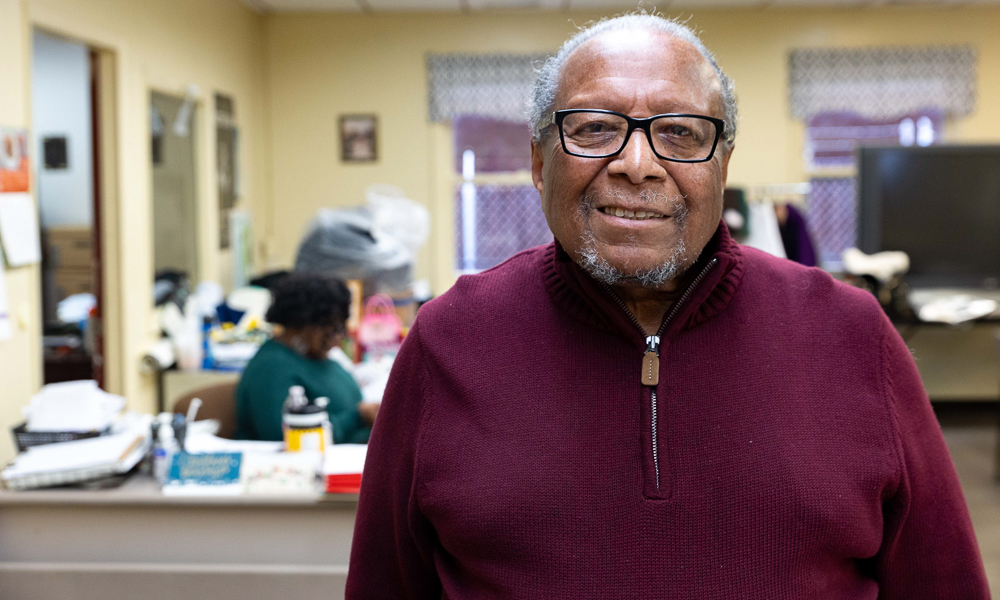

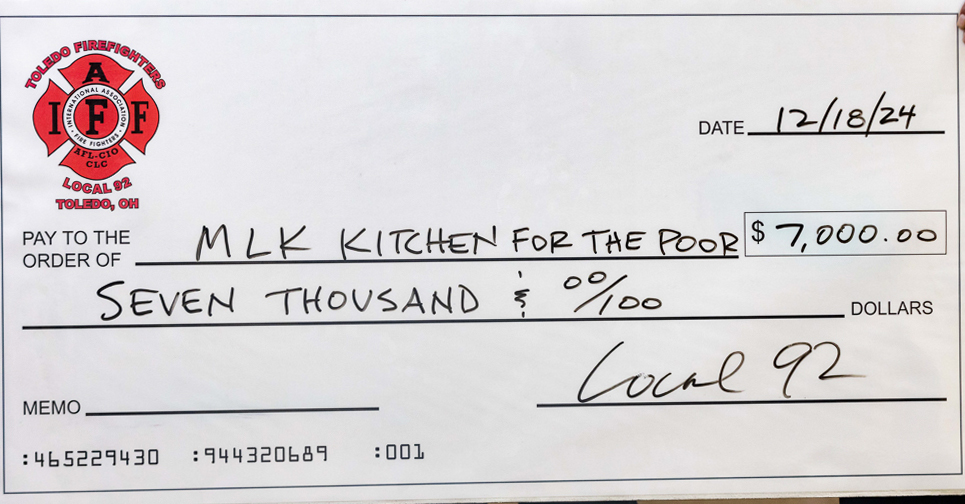

More than 50 years later, the mission is the same, but Savage Jr., executive director for the MLK Kitchen at 650 Vance St., said that it, “seems like the need is greater now than then.”
Savage, Jr. puts the rough estimate of the amount of people fed by the kitchen each day at 300, and the increased need in the community has been “somewhat gradual. You see more people you haven’t seen before.”
Seniors are the demographic he noticed were most affected. “To live off of social security is not enough with the cost of food and utilities,” he said.
To help offset the increased need, the Toledo Firefighters’ Union Local 92 donated $7,000 on Wednesday as the kitchen heads into a busy time of year.
“I can’t remember not getting a check [from the firefighters’ union],” Savage Jr. said, but noted this check was much more substantial than what the firefighters regularly give.
Generally, the union takes a percentage of the firefighters’ checks and uses the money to support numerous charities in Toledo with those funds.
Phil Moline, vice president for the Local 92, said that usually the amount is between $500-1000, but this year a retired union member’s mother passed away and allocated $3,500 to be given to the MLK Kitchen.
“He [the retired union member] asked for it to be given and matched,” Moline said. And the union was happy to help out.
“We go into a lot of homes and environments, so we know this neighborhood,” Moline went on to say. “We’ve always had a lot of people in this neighborhood, and we know this charity.”
The union body elected to match the $3,500 to the MLK Kitchen, and Savage Jr. said the funds would go to operating costs and paying utility bills for the kitchen.
“This is our backyard,” said Joe Cira, president-elect and current secretary treasurer of Local 92. “Their [the kitchen’s] margins are so thin, and they’re not a business. When the cost of groceries goes up it affects everybody else.”
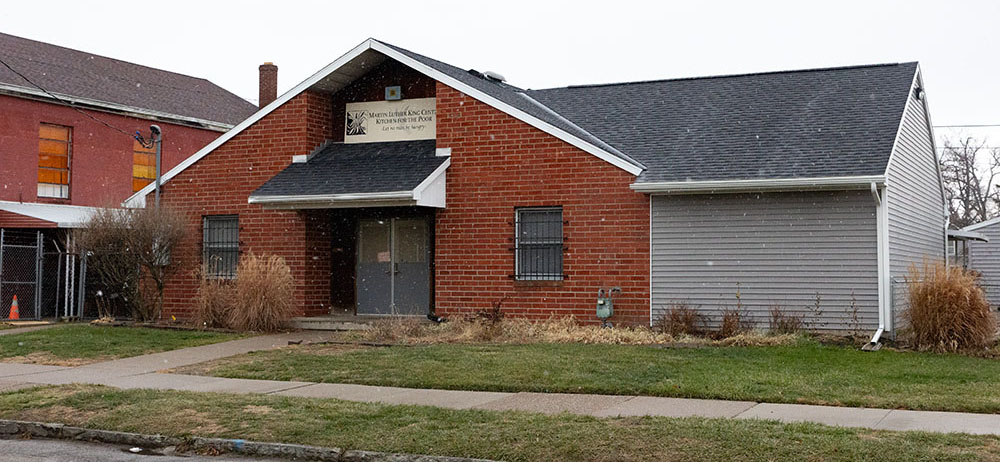

With that, Cira encouraged people to give to local charities and thanked the MLK Kitchen for their work in the Junction neighborhood.
“Firefighters have been great within the community, no matter what happens,” Savage Jr. said.
Food distributions occur Monday through Thursday, and the Kitchen is planning a large Christmas party on Dec. 23 at noon.
“All kids will get a gift, and we’ll have a Santa Claus,” Savage Jr. exclaimed.
To donate or volunteer with the MLK Kitchen for the Poor, go to kitchenforthepoor.org, reach out to them at 419.241.2596, or email them at mlk.kitchen@att.net.
RKP preserves historical buildings


Overmyer Lofts: Economic development winner
TOLEDO – Where are the places in your community that are important to you? That question has long been guiding (and perplexing) community development and planning leaders.
Most cities are comprised of a variety of communities – their downtowns, neighborhoods, suburbs and rural areas. But what actually defines those communities? And which communities take priority?


Matt Wiederhold, executive director of Heritage Ohio (and a Toledo resident), says that community is a combination of the people and places that are there. “Older buildings can bring that sense of place,” he said.
Preservation magazine editor-in-chief Dennis Hockman explains that while people are more important than the things in a community, “the spirit of the people – the heartbeat of the community – is in the old things.”
In the Toledo area, these community treasures are not difficult to find.
“People like buildings that are unique and historic,” Wiederhold said. His organization, Heritage Ohio, leads economic development and sustainability efforts around the state through preservation of historic buildings and promotion of cultural tourism. In addition, Heritage Ohio offers the Ohio Main Street Program to revitalize and improve downtown or central business districts around the state.
Improving our communities and neighborhoods
The Ohio Main Street Program helps cities improve all aspects of their downtown or central business district, including economic management, historic preservation and beautification, scaled to a community’s local resources and conditions.
In fact, Wiederhold wrote one of the first Ohio Main Street Program’s models about Toledo’s UpTown area (specifically the Adams Street area). Current area projects include Sylvania’s Red Bird District, the Defiance Development and Visitors Bureau and the Downtown Fremont project.




Heritage Ohio’s annual conference honors preservation projects with awards for commercial rehabilitation and other projects in large and small cities, along with craftspeople in the field.
Awards have been presented locally to St. Clair Village in 2005 for Best Commercial Rehabilitation, Scott High School’s 2012 renovation for Best Public/Private Partnerships, and an honorable mention for the Toledo Continental Baking Company in 2022 for Best Commercial Rehabilitation Project (large city).
This year, The Overmyer project in downtown Toledo was a finalist in the Best Commercial Rehabilitation Project (large city). Projects are evaluated on their creativity, impact on community, collaboration, adherence to national rehabilitation standards and quality of the final project.
The Overmyer luxury apartments in downtown Toledo is one of several projects developed here by RKP Group (Detroit), such as the Standart Lofts, the Berdan and Fort Industry Square, among others.
“We have invested $150 million in this community, creating 350 downtown apartments and 400 new jobs,” said Kevin Prater, RKP principal and a Toledo resident.
The Overmyer Lofts, which Prater says attracts the majority of its renters from outside of the city, earned a 2024 Preservation Merit Award from the Ohio Historic Preservation Office. The project is also the subject of a Lucas County lawsuit about renovation funds used in the project, which was the former Commerce Paper Co.


Preservation vs. renovation
“Preservation is very important,” said Wiederhold. “I look at an old building as a living structure. It can’t repair itself; it needs to be maintained. It is almost always cheaper to repair an existing structure.”
And in the 20 years Wiederhold lived outside of Toledo (he returned in 2001), he has seen many good projects happening, especially in the Warehouse District of downtown Toledo.
The city has also been involved in many renovation projects, such as converting the North Towne Mall and Southwyck Mall sites to industrial and commercial locations, gaining a $28 million grant for the RIVER East Toledo project and undertaking infrastructure improvements in several city neighborhoods.
Wiederhold remains steadfast about using existing buildings for renovation. “I’m thrilled that the city (of Toledo) values preservation, because once a historic building is gone, it’s never coming back,” Wiederhold said.
Prater agrees. “The future (of development) could be very bright in Toledo,” he said.




